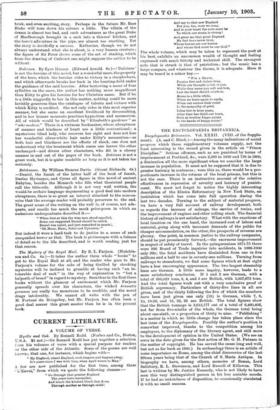progress which these supplementary volumes supply, not the least interesting
is the record given in the article on "Prison Discipline." Serious offences, such as are punished by terms of imprisonment at Portland, &c., were 2,589 in 1859 and 728 in 1900, a diminution all the more significant when we consider the large increase in population. It must not be supposed that it is due to greater leniency in sentences ; were this so, there would be a pro- portionate increase in the returns of the local prisons, but this is not the case. There is an instructive account of the relative effectiveness in repression of severity and leniency of punish- ment. We must not forget to notice the highly interesting description of the Elmira Reformatory in New York State, an institution which has come into full operation during the last two decades. Turning to the subject of material progress, we have a very full account of railway development, both as regards the increase of mileage, the service of trains, and the improvement of engines and other rolling stock. The financial history of railways is not satisfactory. What with the exactions of local taxation on the one hand, the increased cost of labour and material, going along with incessant demands of the public for cheaper accommodation, on the other, the prospects of revenue are gloomy. One point, in common justice to the railway companies, should be put prominently forward,—the enormous improvement in respect of safety of travel. In the quinquennium 1871-75 there were 996 Board of Trade inquiries into accidents, in 1896-1900 only 290; the fatal accidents have diminished from one in five millions and a half to one in seventy-one millions. Turning from railways to steamboats, we find some figures which at first sight have a less encouraging appearance. The two largest steamship lines are German. A little more inquiry, however, leads to a more satisfactory conclusion. If 1 and 2 are German, with a total of 996,023 tons, 3, 4, and 5 are British, with 1,007,673 tons. And the total figures work out with a very conclusive proof of British supremacy. Particulars of thirty-five lines in all are given, and of the thirty following the five of which the numbers have been just given one only (18) is German, while 7, 8, 10, 19-29, and 31, 32, 33 are British. The total figures show that the British tonnage is 3,612,177 out of a total of 6,460,402, not far from five-ninths of the whole, the German total being about one-sixth, or a proportion of thirty to nine. " Publishing " is a matter in which no little change has taken place since the last issue of the Encyclopaedia. Possibly the author's position is somewhat improved, thanks to the competition among his employers, to the diplomacy of the literary agent, and still more to the development of opinion in the United States. (We see an error in the date given for the first action of Mr. G. H. Putnam in the matter of copyright. He has served the cause long and well, but not so far back as 1841.) In archaeology there is an article of some importance on Rome, among the chief discoveries of the last
fifteen years being that of the Church of S. Maria Antigua. In biography we have, among others, memoirs of Raman, Lord Salisbury, R. L. Stevenson, and Lord Russell of Killowen. This last is written by Mr. Justice Kennedy, who is not likely to have seen this very distinguished person in his less amiable moods. If he had no unkindness of disposition, he occasionally simulated it with no small success.






































 Previous page
Previous page